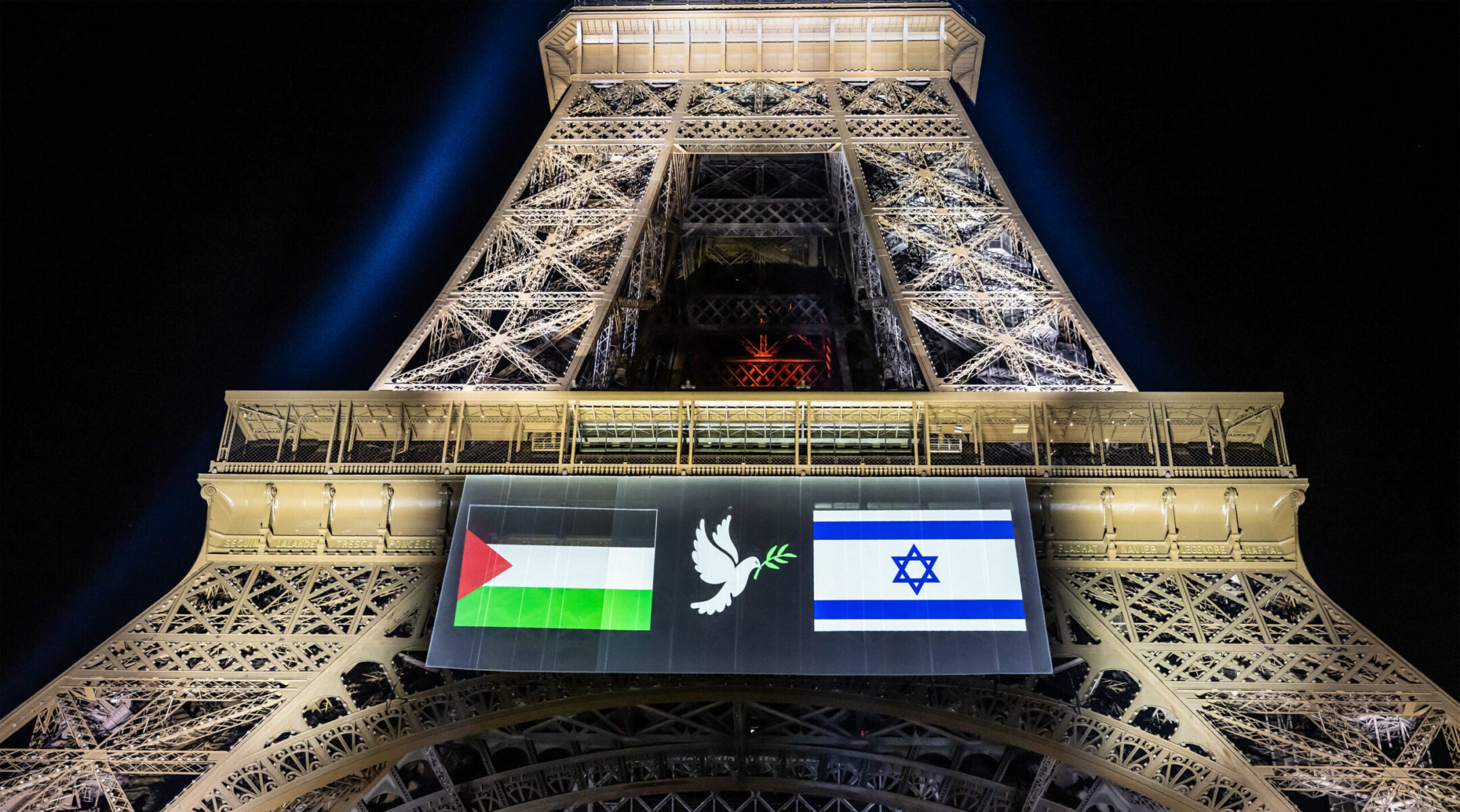Countries begin formally recognizing Palestinian state ahead of UN General Assembly
The annual diplomatic meeting in New York overlaps with Rosh Hashanah

Images of the Palestinian (L) and Israeli (R) flag and a dove with an olive olive branch are projected onto the Eiffel Tower on the eve of France’s planned recognition of the State of Palestine, in Paris, on Sept. 21, 2025. Photo by Bertrand Guay/AFP via Getty Images
(JTA) — The United Kingdom, Portugal, Australia and Canada followed through on their pledges to recognize an independent Palestinian state on Sunday, teeing up a tense week in New York as the United Nations General Assembly gets underway.
France, Belgium and other countries are expected to follow suit during the convening, which comes nearly two years into the Israel-Hamas war in Gaza.
The recognitions have little if any real impact on the experience of Palestinians in Gaza or the West Bank but are rocking preparations for the U.N. meeting, which overlaps with Rosh Hashanah.
The countries say they are trying to jolt the status quo by proactively recognizing a Palestinian state that does not have Hamas at the helm. Several of them had said they would consider averting their planned recognition if the war in Gaza ended before the U.N. meeting, which Hamas and Israel have not agreed to do.
“In the face of the growing horror in the Middle East we are acting to keep alive the possibility of peace and a two-state solution,” British Prime Minister Keir Starmer said in a videotaped address on Sunday. About Hamas, he said, “Our call for a genuine two-state solution is the exact opposite of their hateful vision.”
But the United States and Israel both reject the countries’ moves, saying that recognizing a Palestinian state while Hamas continues to hold power and hostages in Gaza amounts to rewarding terrorism. President Donald Trump called Starmer’s plan “one of our few disagreements” in a joint press conference with the British leader last week.
“You are giving a huge prize to terrorism,” Israeli Prime Minister Benjamin Netanyahu said in a Hebrew-language speech to leaders recognizing a Palestinian state that he published on Sunday. “And I have another message for you: It will not happen. There will be no Palestinian state west of the Jordan.”
Netanyahu said he would issue a formal response to the diplomatic developments when he returns from New York, where he plans to attend the General Assembly.
France and Saudi Arabia are reportedly planning an unofficial meeting to advance a two-state solution on Monday. Meanwhile, an official agenda item on the Middle East has been scheduled for Tuesday afternoon, on the first day of Rosh Hashanah.
The timing of the meeting has affected lobbying by Jewish and pro-Israel groups, though some say they are doing all they can to have influence at the annual gathering.
“While the holiday has compressed the time we have for direct advocacy next week, we will still be vigorously engaged with diplomats from dozens of countries on the statehood recognition issue and other matters that affect Israel and the Jewish people,” a source at the American Jewish Committee told the Jewish Telegraphic Agency.
In a statement, the group denounced the formal unilateral recognition of a Palestinian state on Sunday.
“This action sends a dangerous signal that terrorism, mass murder, rape, torture, and kidnapping are acceptable means of achieving political objectives,” the group said. “It will do nothing to secure the release of hostages and will undermine any genuine prospects for meaningful negotiations between Israelis and Palestinians. As we have previously stated, there is no shortcut to peace.”
The new recognitions add to roughly 140 that countries had made before the current push. They are symbolically significant because Western European countries had largely avoided the diplomatic move until recently.
In some of the European countries newly recognizing a Palestinian state, public sentiment appears to be mixed. One recent poll found that 44% of Britons supported recognition, slightly down since last year; another, released Saturday by the conservative newspaper The Telegraph, found that just 10% supported “unconditional recognition.”
In France, meanwhile, some towns began flying Palestinian flags despite instructions from the national government to avoid doing so.












